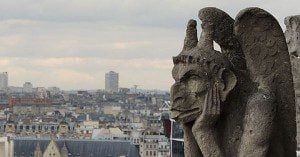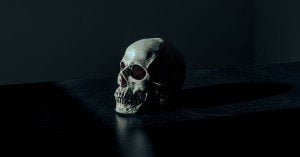Christianity and the Occult
*Note to would-be commenters: Be civil and kind, not hostile or argumentative, or your comment will not be posted her. This is not a discussion board; it is a place for me to express my evangelical-Arminian opinions and interact in a calm, respectful manner with calm, respectful interlocutors. If you post a comment or question, do not include any links or pictures. Be brief and to the point*
For much of my life I have been intensely interested in certain aspects of occultism (very broadly defined as hidden or secret spiritual powers and realities related especially to divination and/or magick—the manipulation of hidden spiritual powers to create or alter reality).
When I was a child, growing up in the “thick” of American conservative Christianity, I was often warned away from things like ouija boards, fortune-tellers, psychic and paranormal phenomenon and practices, etc. I was taught that these things were all “doorways” into Satan’s territory and, when dabbled in, could open oneself up to demonic possession.
Once, when I was about eight years old, just beginning to think for myself and act on my own, I wandered into a fortune-teller’s “tent” at a carnival, paid a quarter, and she read my palms. She told me that I would suffer a severe illness in my fifties. What adult would say that to an eight year old child? I took it seriously and repented and prayed and never told my parents about it. And I never “dabbled” in the occult again, at least not intentionally!
While a PhD student at Rice University, in Houston, I was assigned to co-teach an undergraduate course entitled “Deity, Mysticism, and the Occult.” I had no intention of practicing anything that would fall into the “occult” category, but I nevertheless had a “brush” with it.
I was assigned by the chair of the department to host a renowned expert on psychic phenomena, the paranormal, and varieties of occultism, including Wicca, who would come to speak to the class. He was a Methodist minister and taught religion classes at a Methodist university. I picked him up at the airport. His chosen subject, for his evening lecture, was Modern Neo-Paganism and Wicca. Okay. As soon as he got off the plane and we shook hands, he said “Let’s go find some witches.” Needless to say, I was a bit taken aback. (Since then, this man has become perhaps the main “go-to person” for some national news organizations for information and insight about cults and new religions. He has authored numerous books and taught at several universities including Christian ones.)
I said “How would we find witches?” He said “In the phone book.” So we went to a telephone with an attached Houston phone book and he looked in the Yellow Pages under “Occult.” There were found two “shops” including one near the airport called “The Occult Shoppe.” We drove there. It was then a small stand-alone building, very non-descript, with a small sign outside. My guest speaker boldly barged in and I cautiously slunk in behind him.
I had never seen anything like what I saw inside that store. In brief, it was an authentic Wiccan supply store and, he told me later, obviously a meeting place for a Wiccan coven. There were two middle aged women behind the glass counter that held all kinds of witchcraft paraphernalia. At first they were very hesitant to answer questions. I stayed close to the door, but my guest speaker engaged the two Wiccan priestesses (for that is what they eventually revealed they were) in conversation. They claimed to be the main supply store for about fifty Wiccan covens in the Houston area. He claimed to know very well, in a friendly way, leading Wiccan personalities in various states. They knew them, too. That was what broke the ice and caused them to open up to him.
Anyway, I went on to read widely and deeply in all kinds of literature about especially American neo-Paganism and Wicca and met Wiccans; I even had Wiccans speak to my classes about their beliefs (while insisting that they not practice divination or magick while in my classroom or even on campus). I learned a lot from these experiences and from my research. I did not, however, ever attend any kind of occult event. My interest in occultism has always been academic only.
However, I have wondered where are the boundaries between Christianity and esotericism, occultism, spiritualism? All kinds of things are forbidden in scripture that Christians have done and do unquestioningly—especially things forbidden mostly (or exclusively) in the Old Testament.
Over the years I have discovered, through my reading and research, that spiritualism—attempting to make contact with the dead—was rampant even among Christians in America in the late 19th century. Many Christian churches actually became “spiritualist churches” and seances and such were held in many place including, so reports say, in the White House. To this day there exist numerous “spiritualist churches” (with various names) that consider themselves Christian all around America (and, no doubt, other countries). At least twice weekly I drive by a small brick church that I know to be spiritualist even though its name does not communicate that. I looked up its web site and the “pastor” holds “private sessions” for communicating with the dead for congregants.
Back to my guest speaker. I drove him around Houston for two days. During those times he revealed much to me about his own beliefs and interests. He was, he told me (and I have verified this on the internet), an officer of the Spiritual Frontiers Fellowship—a group of Christian clergy and lay people interested in psychic, paranormal and spiritualist phenomena. It was founded by a “Christian medium” named Arthur Ford. And, yet, this man was (and I assume still is) a Methodist minister. He even claimed to be a “moderately evangelical” Christian. Later, I learned, he served as an expert witness on behalf of some groups alleged by critics to be cults, defending them. He is widely considered a pro-cult personality by anti-cultists. (I make no judgment either way about that in particular.)
Eventually he was hired by a leading Christian university as a visiting scholar—because of his acclaimed reputation as a, perhaps THE, leading expert on cults, new religions, and denominations in America.
His case raises for me the question of the boundary, if any, between occultism and Christianity. To what extent may a person be authentically Christian AND a practitioner of, say, spiritualism? (I am not saying the unnamed person used as a case study here practices spiritualism because I can’t know that, but he was at one time a leader of an organization devoted to the study of psychic, paranormal and spiritualist phenomena founded by a psychic and medium.)
Over the years I have met many self-identified Christians, including some evangelicals, who have dabbled in the occult—from “playing” with ouija boards to “commanding angels.” (I consider the latter practice a form of magick even if the particular charismatic people who told me they could command angels did not consider it so.)
Where is the line a Christian should not cross in this sensitive area of spiritual practice? Does going to fortune tellers, playing with ouija boards, participating in seances automatically call a person’s Christianity into question? Should a Christian college or university hire a person known for being involved with an organization focused on paranormal phenomena including spiritualism? These are questions to which I have no absolute answers, only feelings. What are yours and why?













